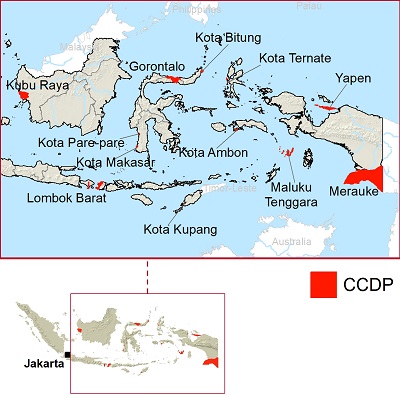Coastal Community Development Project
IFAD Asset Request Portlet
Asset Publisher
Coastal Community Development Project
The overall goal of the project is reduction in poverty and enhanced economic growth for poor but active coastal and small island communities. The development objective is increased household incomes for families involved in fisheries and marine activities in the target communities.
The project will be implemented in eastern Indonesia in areas with a high incidence of poverty. The focus will be on a limited number of districts with diverse marine environments and socio-cultural contexts. The project approach has four main elements:
- Community empowerment continues to be a key strategy underlying government development programmes and shapes the mode of implementation, and provides the basis for project investment activities to work and interact.
- The market-focused strategy and associated interventions will enable fisher and marine households to increase sustainable net returns on fish and other marine products. The community's creation of enterprise groups will be the key intervention to open up economic opportunities. The enterprise groups would be "the engine" in the high-potential value chains supported by the project.
- The focus on poverty and pro-poor targeting has been a determining factor in selecting the project communities. Within those communities, the focus is on the economically active poor and their inclusion in project activities.
- The planned replication and scaling up of project activities and processes has also influenced the selection of districts, and resulted in physical and social diversity and the geographical spread of project districts from West Kalimantan to Papua.

President's reports
President's reports
Project design reports
Project design reports
Supervision and implementation support documents
Supervision and implementation support documents
Supervision mission, May 2017
Supervision mission, 28 April - 13 May 2016
Supervision mission, May 2014
Environmental and social impact assessment
Final environmental and social management framework
Interim (mid-term) review report
Interim (mid-term) review report
Resettlement action framework
PCR digest
Special study
Project list
Audit and Financial Statements
Audit and Financial Statements
Project completion report
Project completion report
Project Completion Report
Co-financiers
Related
Related
Towards zero food waste in Indonesia’s fishing communities
Along Indonesia’s coastal communities, many small-scale fishers struggle to make a living. Indonesia is the world’s third largest producer of fish, but many of these communities have historically lacked access to the technology and resources they needed to preserve their catch until it reaches the markets, which are usually far from their rural coastal inlets.
What helps value chain projects work best for rural producers?
Impact assessment: The Coastal Community Development (CCDP)
Why we should care about vulnerable coastal communities
Approximately 40 per cent of the world’s population lives within 100 kilometers of the coast, and overall the world’s coastal population is increasing fast.